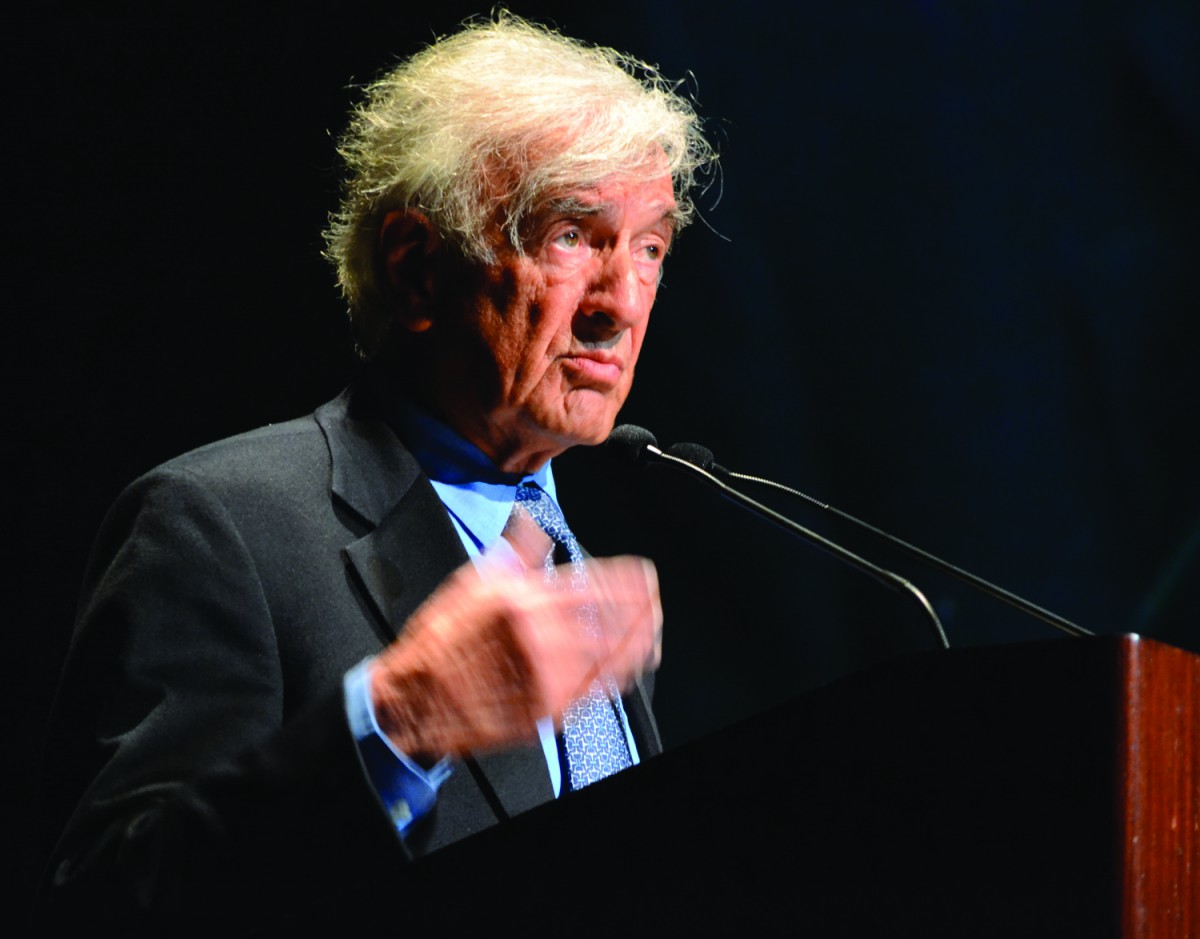The Florida Holocaust Museum celebrated 20 years of life on Feb. 23 at the Mahaffey Theater, honoring Holocaust survivor, professor and author Elie Wiesel with its traditional Loebenberg Award.
Sandy Mermelstein, daughter of the founder of the museum, stood to present Wiesel his award during the event.
She shared how Wiesel’s book “Night” taught many people about the Holocaust; people who didn’t want to hear the details or believe that such acts were possible. Wiesel’s book taught them what they didn’t want to know, representing the big question and theme of the evening—how can something like the Holocaust be prevented from happening again?
Wiesel stepped to the microphone and the 850 people in the audience stood in applause. “Thank you very much for your words and this beautiful gift,” Wiesel said.
He reflected back to 1945 when the American Army came to the concentration camp in Germany where he was taken as a Romanian-born Jewish teen during World War II.
“The words from our lips were not words of anger or words of despair. They were words of gratitude,” he said. They were grateful for those who helped them after the war.
“All of my life really, afterwards, these things I remember—I write them, I teach them,” he said. His goal is to teach gratitude and to “find it in every step of my road.”
He talked about the educated men who were killing women and children—and then going home at night to their wives—asking how this could happen in such a developing century.
Wiesel wondered what would happen when the last witness was gone. He didn’t want to be the last witness, carrying the baggage of memories, which is what motivated him to share his story.
“It took me 10 years to write it,” he said. “Why? Because I was afraid I couldn’t find the words. It would have been easier not to write it.”
In the beginning he and other survivors “were convinced that if we could tell the tale we could change the world,” he said, but despite their efforts, anti-Semitism continues to exist.
“Without anti-Semitism there would be no Auschwitz,” he said.
He talked about all the war, hate and anti-Semitism still existing in the world today and how wherever one looks, there is still bloodshed. He used Syria as an example, asking “How is it possible? Haven’t we learned anything? Where then is hope to be found?”
He reflected back to 20 years ago when he was at the opening of the Florida Holocaust Museum and how they have done so much in such a short time because they realize, “silence is surely not the answer and forgetfulness is close to a crime,” he said.
Before he exited the stage a standing ovation resonated around the room, cascading waves of energy and respect for the man who continues to stand tall in honor of those who perished.
The Florida Holocaust Museum has spent two decades honoring the memory of the Holocaust by creating education, programs and awards. The museum also played a part in Florida becoming the first state to mandate Holocaust education in its schools, where Wiesel’s book “Night” is now required reading. Florida is one of six states to mandate Holocaust education.
The museum was created by Walter and Edie Loebenberg and the Loebenberg Award was created in 2003 as a tribute to their memory. USF President Judy Genshaft received the award in 2007 and is an active member of the museum’s leadership council. The award recognizes individuals who made an outstanding contribution to the Florida Holocaust Museum.
The event started with the singing of the National Anthem and an a acapella singing of “America the Beautiful.” Over 100 college and high school students were seated in the balcony, including students from USFSP, USF Tampa, St. Petersburg College, Eckerd College and the University of Tampa.
A video played on the stage display, showing talk show host Oprah Winfrey walking at Auschwitz. Wiesel was first brought to Auschwitz in 1944 at age 15 and rejoined Winfrey for the episode.
Wiesel’s voice read from his own book, echoing through the theater. “Never shall I forget those flames that consumed my faith forever … Never shall I forget these moments that murdered my God and my soul and turned my dreams to ashes.”
“I have seen so many things in my life … I still can’t grasp it,” he said to Winfrey in the video. “I don’t think I should accept other peoples’ suffering because I suffered.”
Later in the evening, a documentary on the Florida Holocaust Museum was shown, explaining its mission “to remember and to educate.”
Those from the museum shared an exhibit they did called Coexist, which was displayed outdoors in a park in St. Petersburg. It was destroyed overnight. The museum never took it down or fixed the destruction, but left it as evidence of why the museum and its mission are important.
The museum has teaching trunks, which are used all over the country and contain everything a teacher would need to teach about the Holocaust. The museum also awards an Anne Frank Humanitarian Award to high school juniors who are doing something to make the world better. The Speak Up Speak Now! Program, inspired by an 8-year-old girl who was murdered in St. Petersburg, is a program for middle school age students aimed at teaching them about diversity and speaking out against injustice.
Statistics on the screen during the video said Florida ranks third in the U.S. for hate crimes. Yet the museum remains hopeful in changing this—“The future is wide open for us,” the film said.
Marty Borell, museum board chair, spoke after the documentary about Florida’s above average ranking in number of hate crimes. “This is what we face,” he said, quoting Dr. Martin Luther King, Jr. “The fierce urgency of now.”
Photo by Daniel Mutter



